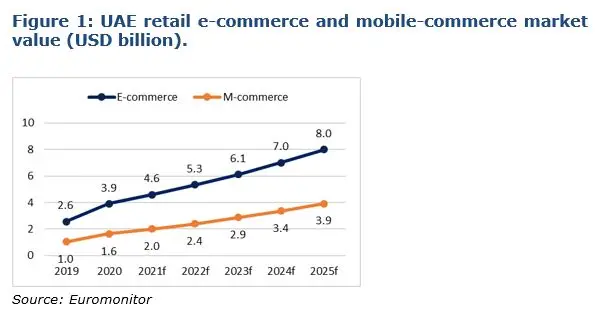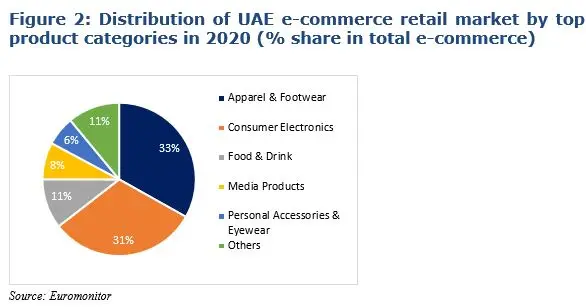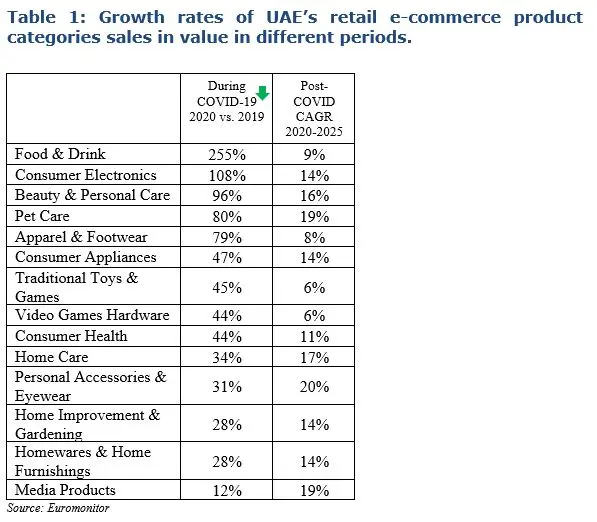PHOTO
- Market value projected to reach $8 billion by 2025, supported by high Internet penetration, modern digital payment systems and strong government support.
Dubai, UAE: The UAE retail e-commerce market reached a record $3.9 billion in 2020, a 53% year-over-year increase driven by the Covid-19-led digital shift, while e-commerce accounted for 8% share of the retail market during the same year, new analysis from Dubai Chamber of Commerce and Industry has revealed.
The study, based on recent data from Euromonitor, projected the value of the market to grow by a compound annual growth rate (CAGR) to reach $8 billion by 2025, a growth trend supporting by several key factors such as high-income potential, high Internet penetration rate (99%), developed transport logistics network, modern digital payment systems, growing tech-savvy youth population, and strong government support.
Growth drivers
The UAE has the highest Smartphone penetration rate in the MENA region that has influenced the growth of mobile-commerce (or m-commerce). The share of m-commerce in the UAE e-commerce market increased from 29% in 2015 to 42% in 2020. Moreover, in 2020, UAE retail m-commerce retail market value reached $1.6 billion, 56% higher than the previous year. The retail m-commerce market of UAE is projected to reach USD 3.9 billion by 2025, and grow with a CAGR of 18.9% between 2020 and 2025.


The UAE and Dubai in particular, remain hubs for e-commerce growth in the MENA region. Changing consumer habits during Covid-19 has accelerated the growth of digital shopping. According to data from the UAE National Economic Register, the UAE e-commerce sector issued the highest number of licenses of 196 in May 2020.
Many companies had a significant investment in online sales activity during the pandemic and managed to grow or keep stable their businesses using omni-channel methods.
Market challenges
Despite some growth opportunities, there are some challenges in the e-commerce market, such as cash on delivery. However, during the pandemic the share of this payment method was significantly reduced, due to hygienic measures and development of contactless payments.
Moreover, some online retailers faced financial pressure to due high costs. Apart from picking, packing and delivery cost, one of the biggest costs is high returns of products. Experts have found that people return 15% to 40% of what they buy online, compared to 5% to 10% for in-store shopping. However, the improvements of online product details, customer support and visualisation, the product returns are expected to go down.
E-commerce activity
E-commerce has been predominant during the COVID-19 outbreak, and many retailers have put much effort into building, improving, and promoting their online shops. Several small retailers in UAE that did not manage online stores before the shutdown, developed temporary solutions to sell their products online, for instance, posted their products on Amazon or social media and provided pick-up or delivery services. Companies that were selling high-demand products, e.g. food and computers, increased their share in UAE’s e-commerce market during the pandemic.
According to Euromonitor data, in 2020 apparel and footwear e-commerce category had the highest share of 33% ($1.3 billion) in the UAE retail e-commerce market. Despite some lockdown measures, the online share of this category slightly increased in 2020, due to the growing demand for comfortable style clothing, such as T-shirts, sweatshirts and hoodies.
The next biggest category in UAE retail e-commerce was consumer electronics with a share of 31% ($1.2 billion). In this category, the demand was high especially for laptops, personal computers and tablets, due to the remote working and online education. Food and drink were the third largest category (11% or $400 million) in the UAE retail e-commerce market in 2020. The online demand in this category was especially high for staple food, ready to eat food and healthy food products.


Many big retailers developed and enhanced mobile apps to increase online sales and to improve customer’s access to the products. According to the latest data of the Telecommunications Regulatory Authority of UAE, there are in total 52 purchasing apps in the UAE that specialised in food, beverage and pharmaceutical products. The purchase on mobile apps is highly especially among Gen Z, but millennials were feeling more comfortable on a desktop, as reported by Euromonitor.
Performance of Product Categories
According to Euromonitor, during the COVID-19 pandemic (2019-2020), the retail e-commerce of Food and Drink, and Consumer Electronics products had triple-digit growth rates. Other product groups which had more than 50% growth rates include beauty and personal care, pet care, and apparel and footwear.


It is expected that the highest growing product in the UAE e-commerce market will be personal accessories and eyewear with a CAGR of 20% from 2020 to 2025, followed by media products, pet care and home care products.
E-commerce trends expected to gain momentum with consumers include quicker, safer, more intuitive and personalised experiences, voice-activated shopping, contextual and social commerce, virtual instant reordering, and product subscriptions combined with conveniences such as same-day delivery and competitive pricing will draw more consumers to choose Ecommerce over traditional face-to-face (F2F) channels.
-Ends-
Established in 1965, the Dubai Chamber of Commerce & Industry is a non-profit public entity, whose mission is to represent, support and protect the interests of the business community in Dubai by creating a favourable business environment, supporting the development of business, and by promoting Dubai as an international business hub.
For more information, please contact:
Ruba Abdel Halim
Manager, PR & Corporate Communications
Tel: +971 4 2028450
Email: ruba.halim@dubaichamber.com
© Press Release 2021
Disclaimer: The contents of this press release was provided from an external third party provider. This website is not responsible for, and does not control, such external content. This content is provided on an “as is” and “as available” basis and has not been edited in any way. Neither this website nor our affiliates guarantee the accuracy of or endorse the views or opinions expressed in this press release.
The press release is provided for informational purposes only. The content does not provide tax, legal or investment advice or opinion regarding the suitability, value or profitability of any particular security, portfolio or investment strategy. Neither this website nor our affiliates shall be liable for any errors or inaccuracies in the content, or for any actions taken by you in reliance thereon. You expressly agree that your use of the information within this article is at your sole risk.
To the fullest extent permitted by applicable law, this website, its parent company, its subsidiaries, its affiliates and the respective shareholders, directors, officers, employees, agents, advertisers, content providers and licensors will not be liable (jointly or severally) to you for any direct, indirect, consequential, special, incidental, punitive or exemplary damages, including without limitation, lost profits, lost savings and lost revenues, whether in negligence, tort, contract or any other theory of liability, even if the parties have been advised of the possibility or could have foreseen any such damages.




















